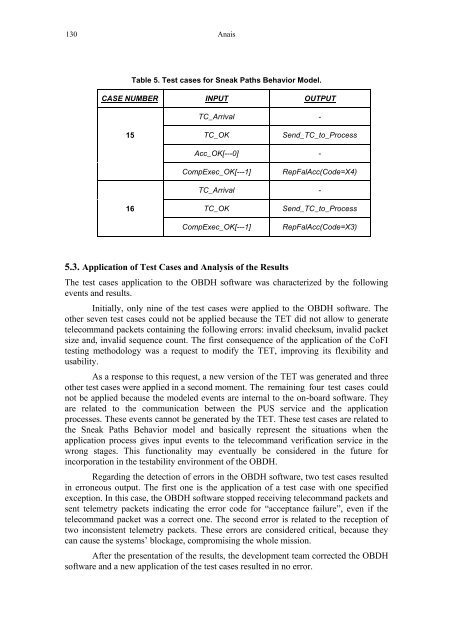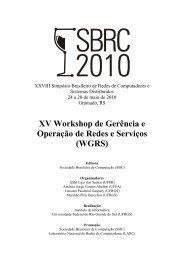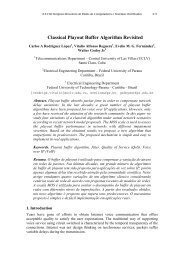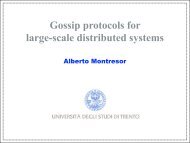XI Workshop de Testes e Tolerância a Falhas (WTF) - SBRC 2010
XI Workshop de Testes e Tolerância a Falhas (WTF) - SBRC 2010
XI Workshop de Testes e Tolerância a Falhas (WTF) - SBRC 2010
Create successful ePaper yourself
Turn your PDF publications into a flip-book with our unique Google optimized e-Paper software.
130 Anais<br />
Table 5. Test cases for Sneak Paths Behavior Mo<strong>de</strong>l.<br />
CASE NUMBER INPUT OUTPUT<br />
TC_Arrival -<br />
15 TC_OK Send_TC_to_Process<br />
Acc_OK[---0] -<br />
CompExec_OK[---1]<br />
RepFalAcc(Co<strong>de</strong>=X4)<br />
TC_Arrival -<br />
16 TC_OK Send_TC_to_Process<br />
CompExec_OK[---1]<br />
RepFalAcc(Co<strong>de</strong>=X3)<br />
5.3. Application of Test Cases and Analysis of the Results<br />
The test cases application to the OBDH software was characterized by the following<br />
events and results.<br />
Initially, only nine of the test cases were applied to the OBDH software. The<br />
other seven test cases could not be applied because the TET did not allow to generate<br />
telecommand packets containing the following errors: invalid checksum, invalid packet<br />
size and, invalid sequence count. The first consequence of the application of the CoFI<br />
testing methodology was a request to modify the TET, improving its flexibility and<br />
usability.<br />
As a response to this request, a new version of the TET was generated and three<br />
other test cases were applied in a second moment. The remaining four test cases could<br />
not be applied because the mo<strong>de</strong>led events are internal to the on-board software. They<br />
are related to the communication between the PUS service and the application<br />
processes. These events cannot be generated by the TET. These test cases are related to<br />
the Sneak Paths Behavior mo<strong>de</strong>l and basically represent the situations when the<br />
application process gives input events to the telecommand verification service in the<br />
wrong stages. This functionality may eventually be consi<strong>de</strong>red in the future for<br />
incorporation in the testability environment of the OBDH.<br />
Regarding the <strong>de</strong>tection of errors in the OBDH software, two test cases resulted<br />
in erroneous output. The first one is the application of a test case with one specified<br />
exception. In this case, the OBDH software stopped receiving telecommand packets and<br />
sent telemetry packets indicating the error co<strong>de</strong> for “acceptance failure”, even if the<br />
telecommand packet was a correct one. The second error is related to the reception of<br />
two inconsistent telemetry packets. These errors are consi<strong>de</strong>red critical, because they<br />
can cause the systems‟ blockage, compromising the whole mission.<br />
After the presentation of the results, the <strong>de</strong>velopment team corrected the OBDH<br />
software and a new application of the test cases resulted in no error.







